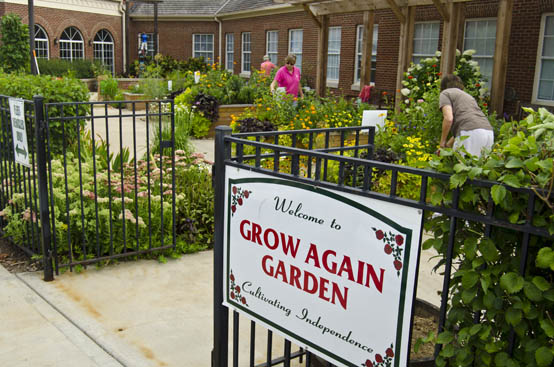Cardinal Hill patients find health in the garden
Cardinal Hill patients find health in the garden

At Cardinal Hill Rehabilitation Hospital in Lexington, patients find help and perhaps solace in a small, special spot that seems to grow hope no matter what the challenge—The Grow Again Garden.
The Grow Again Garden, managed by Extension Master Gardeners Betsy Adler and Sharon Bennett, with help from a volunteer team of other master gardeners, is a living laboratory for education and therapeutic relief. Adler and Bennett graduated from the same Extension Master Gardeners class, a program offered by the University of Kentucky Cooperative Extension Service, where they studied a variety of subjects relating to ornamental and vegetable gardening. Program graduates are required to share their knowledge with others through volunteer opportunities. Bennett was already volunteering in another capacity at Cardinal Hill, and when Adler showed interest in developing an accessible garden, they started their program there.
With a generous grant from the Junior League of Lexington in 2006, the rehabilitation hospital built raised beds and a tool shed, purchased adaptive tools and bought flowers. The original garden was behind the pediatrics building in what is now a parking lot. When they began major renovations in the fall of 2008, the hospital committed to building a truly accessible garden with paved access. The new location facing Mason Headley Road opened the following year. The garden illustrates the number and variety of plants that can exist within a small, confined space.
Traditional plantings of roses; a hummingbird garden; the pizza garden, a circular bed where ingredients that would top a pizza grow; and native plants designed to attract backyard wildlife fill the space between the parking lot and the hospital. The garden, filled with milkweeds, which are essential for monarch caterpillars, and other butterfly-attracting plants is designated as an official monarch butterfly waystation by Monarch Watch, a national organization dedicated to conservation, research and education.
“The hospital has been fantastic to give us free rein,” Bennett said.
Jennifer Bricking, volunteer service coordinator for Cardinal Hill, said she doesn’t know of any other rehabilitation hospitals that have anything like it.
“The smiles that I see out there, it’s worth a million dollars to me,” she said. “I took a patient’s mom out there, and when we picked flowers together she started to cry. She said she hadn’t been out of the room since they got there. That, to me, was everything.”
With a cutting garden and vegetables right outside the door, patients and staff are encouraged to visit the garden and pick flowers or produce. Though that simple act can brighten someone’s day, therapists are also finding other value in the garden.
Cardinal Hill cares for patients of all ages with a variety of needs. Those undergoing rehabilitation might concentrate on improving flexibility, balance or strength. The hospital also treats youngsters who need to work on focusing their attention, following directions better or overcoming other physical or behavioral problems. Becky Johnson, a pediatric occupational therapist at the hospital, likes to visit the vegetable plants with children in her food groups who are picky eaters.
“They get to touch it, pick it, smell it, feel it and learn that food comes from plants, not the grocery store. We need to educate the kids, as well as their parents, about healthy eating and where their food comes from,” Johnson said. “Usually they (the youngsters) are excited; they have fun with it. Some of them don’t want to touch it, because they’re still kind of afraid of it. Occasionally you’ll hear a kid say, ‘That comes out of the dirt. I’m not allowed to eat dirt.’”
Johnson also works with young people who have sensory processing problems.
“Of course, we have a lot of herbs in the garden and picking and smelling the herbs is certainly a way to stimulate the olfactory senses, which is a new experience for a lot of the kids,” she said.
Adler and Bennett figure the patients into their weekly gardening tasks.
“When we’re here on Tuesdays, the first thing we do is put our heads together and come up with three things that a patient can do,” Bennett said. “For example, today I bought a box of fresh vegetable plants, so if anybody decides to come out and work in the garden, they can plant them. And if they need help, we’ll help them.”
The garden is designed to encourage people to garden despite disabilities. Raised beds and troughs bring the plants closer to patients, and a variety of tools are available to make the work a little easier.
“Our whole idea is, even though you’re in a wheelchair or you can’t get down on the ground, you can still garden,” Adler said. “We have tools that are for different uses of accessibility. You can do whatever is comfortable for you and still garden.”
They even have a bare patch of soil beneath a sign that boasts “We Dig Dirt,” where children and adults can practice hand skills by digging.
The garden, which has won a number of awards over the years, turns out to be as therapeutic for the gardeners as it is for the patients.
“We see people come out and look around, and you’ll notice they’re starting to sit up a little straighter,” Bennett said. “You might get a glimmer of a smile. Sometimes they just want to tell us their story or share gardening tips with us. It’s just wonderful.”
The Extension Master Gardener program trains volunteers who assist county extension agents with educational programming. Volunteers are an important component of the UK Cooperative Extension Service’s outreach. Horticulture agents in local county extension offices have information about Extension Master Gardener classes.
Extension Horticulture

